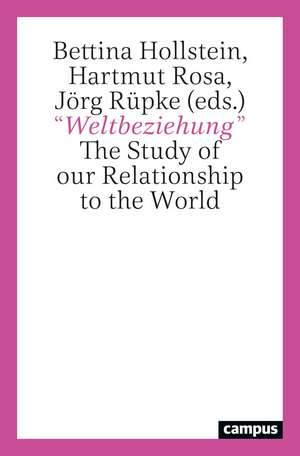Weltbeziehung – The Study of our Relationship to the World
Autor Bettina Hollstein, Harmut Rosa, Jörg Rüpkeen Limba Engleză Paperback – 25 ian 2024
Human beings are always and essentially placed and situated in a world to which they relate, and it is this relationship that defines them. This book describes the historical and cultural variety of self-world-relations of this kind and revolves around aspects and dimensions of what Hartmut Rosa has gathered under the term “Weltbeziehung” (relationship to the world), expanding on his theory on resonance.
This book starts from this innovative approach to discuss socially relevant questions and conceptions of the present, like property, progress, or markets and then contrasts them with non-Western or non-modern forms of “Weltbeziehungen” like specific conceptions of virtue or fatalistic practices. In an effort to overcome Eurocentric biases, the book also includes studies about the decolonization of research in India and the role of markets in China. In addition, comparisons across time help to further refine our understanding of “Weltbeziehungen.” Finally, the volume’s contributions discuss a number of challenges and practical problems of the contemporary world such as the migration crises, sharing practices, or knowledge production in light of this conception.
Preț: 269.09 lei
Nou
Puncte Express: 404
Preț estimativ în valută:
51.49€ • 53.76$ • 42.61£
51.49€ • 53.76$ • 42.61£
Carte disponibilă
Livrare economică 10-17 martie
Livrare express 28 februarie-06 martie pentru 31.99 lei
Preluare comenzi: 021 569.72.76
Specificații
ISBN-13: 9783593518206
ISBN-10: 3593518201
Pagini: 296
Dimensiuni: 138 x 211 x 24 mm
Greutate: 0.38 kg
Ediția:Nouă
Editura: CAMPUS VERLAG
ISBN-10: 3593518201
Pagini: 296
Dimensiuni: 138 x 211 x 24 mm
Greutate: 0.38 kg
Ediția:Nouă
Editura: CAMPUS VERLAG
Notă biografică
Bettina Hollstein is an economist and academic manager of the Max Weber College at the University of Erfurt. Hartmut Rosa is a sociologist and director of the Max Weber College at the University of Erfurt. Jörg Rüpke is a religious scientist and deputy director of the Max Weber College at the University of Erfurt.
Cuprins
Introduction
Bettina Hollstein, Hartmut Rosa, Jörg Rüpke
I. Conceptual Perspectives
Property as a World Relation (Weltverhältnis). Reflections on the Structural Change of Possessive “Weltbeziehung”
Hartmut Rosa
Relationship to the Good. On the World-opening and World-connecting Power of the Virtues
Kathi Beier and Dietmar Mieth
Three Types of Fatalistic Practice
Andreas Pettenkofer
Reconstructing an Impartial and Pluralistic Notion of Progress in Contexts of Diversity
Achim Kemmerling
II. Comparative Perspectives
How Can Worldviews Be Compared? Pragmatist Maxims and Intellectual Honesty
Hermann Deuser and Markus Kleinert
“Theorizing Across Traditions”: Social Science as a Polyphonic Encounter
Martin Fuchs, Antje Linkenbach and Beatrice Renzi
The Cultural Meaning of ‘Market’ in China and the Western Tradition: Worlds Apart?
Carsten Herrmann-Pillath and Qian Zhao
Triumphant Utopia – Shabby Bourgeois World – Totalitarianism. Transmuting Visions of Real Existing Socialism in Eastern Interpretations of Walter Benjamin’s Marxism
Gábor Gángó
Relating to Other Worlds: Religious Spatiality and the Beyond of the City in Ancient Cities’ Dealing with the Dead
Jörg Rüpke
III. Practical Perspectives
Values of Exchange, Values of Sharing: The Ambivalence of Economic “Weltbeziehung”, Explained for the Example of Carsharing
Christoph Henning
The Transformation of the Refugee Category and the Dialectics of Solidarity in Europe
Nancy Alhachem
Living World Relations – Institutes for Advanced Study as Places for Resonant Relationships
Bettina Hollstein
Bettina Hollstein, Hartmut Rosa, Jörg Rüpke
I. Conceptual Perspectives
Property as a World Relation (Weltverhältnis). Reflections on the Structural Change of Possessive “Weltbeziehung”
Hartmut Rosa
Relationship to the Good. On the World-opening and World-connecting Power of the Virtues
Kathi Beier and Dietmar Mieth
Three Types of Fatalistic Practice
Andreas Pettenkofer
Reconstructing an Impartial and Pluralistic Notion of Progress in Contexts of Diversity
Achim Kemmerling
II. Comparative Perspectives
How Can Worldviews Be Compared? Pragmatist Maxims and Intellectual Honesty
Hermann Deuser and Markus Kleinert
“Theorizing Across Traditions”: Social Science as a Polyphonic Encounter
Martin Fuchs, Antje Linkenbach and Beatrice Renzi
The Cultural Meaning of ‘Market’ in China and the Western Tradition: Worlds Apart?
Carsten Herrmann-Pillath and Qian Zhao
Triumphant Utopia – Shabby Bourgeois World – Totalitarianism. Transmuting Visions of Real Existing Socialism in Eastern Interpretations of Walter Benjamin’s Marxism
Gábor Gángó
Relating to Other Worlds: Religious Spatiality and the Beyond of the City in Ancient Cities’ Dealing with the Dead
Jörg Rüpke
III. Practical Perspectives
Values of Exchange, Values of Sharing: The Ambivalence of Economic “Weltbeziehung”, Explained for the Example of Carsharing
Christoph Henning
The Transformation of the Refugee Category and the Dialectics of Solidarity in Europe
Nancy Alhachem
Living World Relations – Institutes for Advanced Study as Places for Resonant Relationships
Bettina Hollstein
